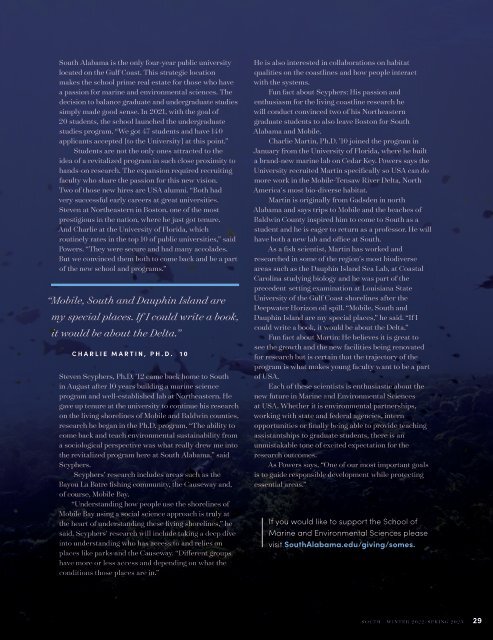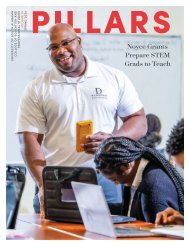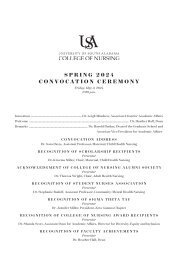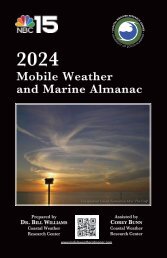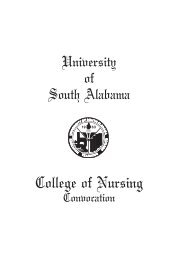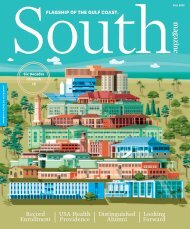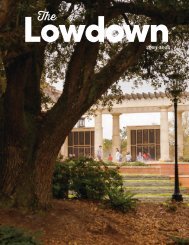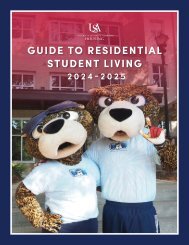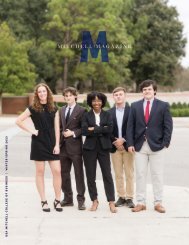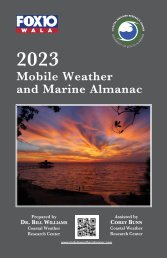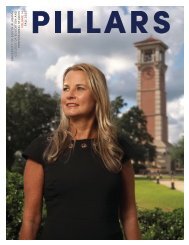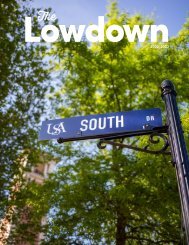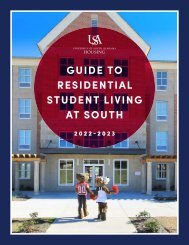South Magazine Winter 2022/Spring 2023
University of South Alabama's Alumni Magazine
University of South Alabama's Alumni Magazine
You also want an ePaper? Increase the reach of your titles
YUMPU automatically turns print PDFs into web optimized ePapers that Google loves.
<strong>South</strong> Alabama is the only four-year public university<br />
located on the Gulf Coast. This strategic location<br />
makes the school prime real estate for those who have<br />
a passion for marine and environmental sciences. The<br />
decision to balance graduate and undergraduate studies<br />
simply made good sense. In 2021, with the goal of<br />
20 students, the school launched the undergraduate<br />
studies program. “We got 47 students and have 140<br />
applicants accepted [to the University] at this point.”<br />
Students are not the only ones attracted to the<br />
idea of a revitalized program in such close proximity to<br />
hands-on research. The expansion required recruiting<br />
faculty who share the passion for this new vision.<br />
Two of those new hires are USA alumni. “Both had<br />
very successful early careers at great universities.<br />
Steven at Northeastern in Boston, one of the most<br />
prestigious in the nation, where he just got tenure.<br />
And Charlie at the University of Florida, which<br />
routinely rates in the top 10 of public universities,” said<br />
Powers. “They were secure and had many accolades.<br />
But we convinced them both to come back and be a part<br />
of the new school and programs.”<br />
“Mobile, <strong>South</strong> and Dauphin Island are<br />
my special places. If I could write a book,<br />
it would be about the Delta.”<br />
– CHARLIE MARTIN, PH.D. ’ 10<br />
Steven Scyphers, Ph.D. ’12 came back home to <strong>South</strong><br />
in August after 10 years building a marine science<br />
program and well-established lab at Northeastern. He<br />
gave up tenure at the university to continue his research<br />
on the living shorelines of Mobile and Baldwin counties,<br />
research he began in the Ph.D. program. “The ability to<br />
come back and teach environmental sustainability from<br />
a sociological perspective was what really drew me into<br />
the revitalized program here at <strong>South</strong> Alabama,” said<br />
Scyphers.<br />
Scyphers’ research includes areas such as the<br />
Bayou La Batre fshing community, the Causeway and,<br />
of course, Mobile Bay.<br />
“Understanding how people use the shorelines of<br />
Mobile Bay using a social science approach is truly at<br />
the heart of understanding these living shorelines,” he<br />
said. Scyphers’ research will include taking a deep dive<br />
into understanding who has access to and relies on<br />
places like parks and the Causeway. “Diferent groups<br />
have more or less access and depending on what the<br />
conditions those places are in.”<br />
He is also interested in collaborations on habitat<br />
qualities on the coastlines and how people interact<br />
with the systems.<br />
Fun fact about Scyphers: His passion and<br />
enthusiasm for the living coastline research he<br />
will conduct convinced two of his Northeastern<br />
graduate students to also leave Boston for <strong>South</strong><br />
Alabama and Mobile.<br />
Charlie Martin, Ph.D. ’10 joined the program in<br />
January from the University of Florida, where he built<br />
a brand-new marine lab on Cedar Key. Powers says the<br />
University recruited Martin specifcally so USA can do<br />
more work in the Mobile-Tensaw River Delta, North<br />
America's most bio-diverse habitat.<br />
Martin is originally from Gadsden in north<br />
Alabama and says trips to Mobile and the beaches of<br />
Baldwin County inspired him to come to <strong>South</strong> as a<br />
student and he is eager to return as a professor. He will<br />
have both a new lab and ofce at <strong>South</strong>.<br />
As a fsh scientist, Martin has worked and<br />
researched in some of the region's most biodiverse<br />
areas such as the Dauphin Island Sea Lab, at Coastal<br />
Carolina studying biology and he was part of the<br />
precedent -setting examination at Louisiana State<br />
University of the Gulf Coast shorelines after the<br />
Deepwater Horizon oil spill. “Mobile, <strong>South</strong> and<br />
Dauphin Island are my special places,” he said. “If I<br />
could write a book, it would be about the Delta.”<br />
Fun fact about Martin: He believes it is great to<br />
see the growth and the new facilities being renovated<br />
for research but is certain that the trajectory of the<br />
program is what makes young faculty want to be a part<br />
of USA.<br />
Each of these scientists is enthusiastic about the<br />
new future in Marine and Environmental Sciences<br />
at USA. Whether it is environmental partnerships,<br />
working with state and federal agencies, intern<br />
opportunities or fnally being able to provide teaching<br />
assistantships to graduate students, there is an<br />
unmistakable tone of excited expectation for the<br />
research outcomes.<br />
As Powers says, “One of our most important goals<br />
is to guide responsible development while protecting<br />
essential areas.”<br />
If you would like to support the School of<br />
Marine and Environmental Sciences please<br />
visit <strong>South</strong>Alabama.edu/giving/somes.<br />
SOUTH | WINTER <strong>2022</strong>/SPRING <strong>2023</strong><br />
29


